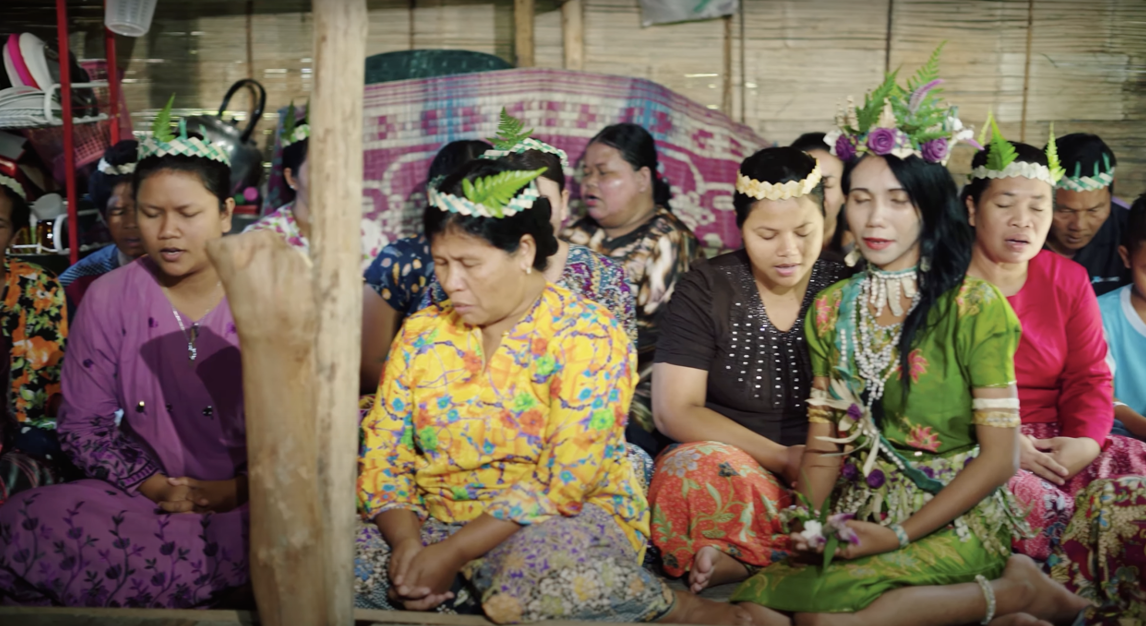50th Session of the Human Rights Council
13 June - 8 July 2022
ITEM 10 - Technical assistance and capacity-building in the field of human rights in the Central African Republic
6 July 2022
By Amie Sillito / GICJ
Executive Summary
The United Nations Human Rights Council extended its mandate in the Central African Republic (CAR) regarding the human rights abuses and the current political instability in the country. The Independent Expert commended the CAR government on progress made in the country since his last report on tackling impunity and ensuring redress for victims of human rights violations.
The current threat against humanitarian aid workers was discussed as well as the lack of action taken against the illegal arms trade in the country following the arms embargo. The presence of international mercenary groups was also highlighted during the Interactive Dialogue and the government was encouraged to expel all actors who did not conform to the ceasefire or respect human rights and humanitarian law. The responses of most delegates were positive and numerous representatives confirmed that they would continue to support the CAR government and its efforts as well as the Expert’s work. It was suggested that the CAR should find an African solution to its African based problems instead of implementing international solutions to its domestic affairs.
Geneva International Centre for Justice (GICJ) commends the extension of the Council’s mandate on the CAR. Concern was raised over the threat to humanitarian aid workers’ safety and food insecurity in the country as over 40% of children suffer from malnutrition. The international community is also urged to make available all medical resources and financial aid following the COVID-19 pandemic.
Background
The Expert was requested to provide an oral update to the Council at the 50th Session of the Human Rights Council, on his report on technical assistance and capacity building in the field of human rights in the Central African Republic. Since 2012, the CAR has faced ongoing violence between rebel groups and the government who were accused of breaching peace agreements. As a result, the country’s economy and infrastructure has suffered, leaving millions of civilians without clean water, health care, food, or access to adequate housing. The number of internally displaced people rose, and humanitarian aid struggled to cope with the influx of people. The previous report on the situation in the CAR indicated that over 720,000 people are homeless and an estimated 3.1 million people require humanitarian assistance due to the ongoing violence, COVID-19, and political instability. The aftermath of the conflict has resulted in multiple peace treaties being signed despite violence and attacks persisting against the civilian population.
On the 30th of March 2022, at the 52nd meeting of the 49th Regular Session of the HRC, the human rights situation in the CAR was discussed at length. Various experts, state representatives and other stakeholders reiterated their commitment to supporting efforts to end the violence. It was noted that the government in the CAR had made progress regarding redress for victims of sexual violence. The government had appointed two councils to address the issue which was seen as a step forward in ensuring accountability for perpetrators of these human rights abuses. Since then, the Independent Expert has monitored the situation and collated information and key data findings regarding the situation on the ground.
Independent Expert Oral Update on the Human Rights Situation in the Central African Republic
Mr Yao Agbetse, Independent Expert on the situation of human rights in the Central African Republic, delivered his opening remarks to the Council by expressing his satisfaction with some of the positive developments which had taken place since his previous oral update.
In April 2022, the new Special Representative of the Secretary General of the United Nations in the CAR, and head of MINUSCA, Ms Valentine Rugwabiza adopted her post. On the 19th of April 2022, the first trial of the Special Criminal Court commenced regarding the killings which took place in May 2019 in the villages of Koundjili and Lemouna. The case involved a trial against members of the 3R rebel group for war crimes and crimes against humanity. The incidents were the first major violation of the 2019 peace agreement between the government and rebels.
Furthermore, on the 27th of May 2022 the law abolishing the death penalty was adopted. The Expert commended the passing of the bill and called on the CAR government to promulgate the law with haste. Criminal hearings into sexual violence committed by perpetrators during the conflict was examined on the 29th of April until the 31st of May 2022 and then extended at the appeal court in Bangui. In total, seven rape cases were examined which culminated in the sentencing of all perpetrators charged in the cases. Regarding the human rights situation since the previous oral update, Mr Agbetse revealed that the situation has remained concerning. 436 incidents were documented as human rights violations and abuses which represents a decrease of 42% in incidents and a reduction of 24% in the number of victims compared to the third and fourth quarter in 2021.
The Expert emphasised that there needs to be effective implementation of development projects. In principle, projects affecting the civilian population, including social development projects and those relating to health, education, access to water, and electricity, should not be prejudiced by sanctions. Mr Agbetse called on all members of the Council, the World Bank, and the EU to find practical and adaptive solutions with the Central African authorities. He invited the Central African leadership to demonstrate greater commitment to agreements with signed donors to rapidly adopt anti-corruption laws. The Expert stressed his concern for the situation with the World Bank, stating that the CAR will experience an increase in social tension which may lead to an even more fragile situation in the conflict areas. Instability will provide new opportunities for armed groups to infiltrate society and assume belligerent activities in direct violation of international human rights and international humanitarian law. Consequently, pressure on migration channels towards Europe will increase and all the progress achieved by NGOs and international actors would be in vain. He emphasised that the international community must act urgently. Hence, he called on the World Bank, the IMF and the European Union to integrate into the microeconomic analysis, the human rights dimension regarding the CAR.
It was emphasised that the government must follow up on conclusions of investigations conducted by its Special Commission of Inquiry set up in 2021 into allegations of atrocities committed in the country. The Expert also encouraged the government to invest in the youth as education is vital to facilitate economic restructuring and political and social stability. Mr Agbetse called upon the African Union, MINUSCA, UNESCO, the EU, and the World Bank to significantly increase their technical and financial support in the country, specifically in the vocational training sector. He stressed that this would aid the CAR in overcoming unemployment, encourage entrepreneurship, and the socio-economic reintegration of children and young persons. The Expert stated that he remained deeply concerned about hate speech in the country which has resulted in violent attacks. Disinformation and manipulation on social media are serious issues which have resulted in the poisoning of the relationship between the CAR’s authorities, their technical and financial partners, and other organisations in society. He also stated that this has slowed reconciliation and peace building processes in the country, whereby he called on the CAR authorities to use whatever means necessary to redress the issue. The Expert concluded his statement by urging the Council to amend the resolution, which is to be adopted in September 2022, given changes to the capacity of CAR institutions responsible for combatting impunity and promoting the rule of law and good governance.
Interactive Dialogue on the Independent Expert’s Oral Update
 Geneva, 6 July 2022- At the 37th meeting of the 50th Regular session, the Human Rights Council (HRC) held an Interactive Dialogue regarding the state of human rights in the Central African Republic following the Oral update on the situation by the Independent Expert. Subsequent to Mr Agbetse’s update, the Vice- President gave the floor to the country concerned in order to respond to the Expert’s update following which several interested delegations took the floor.
Geneva, 6 July 2022- At the 37th meeting of the 50th Regular session, the Human Rights Council (HRC) held an Interactive Dialogue regarding the state of human rights in the Central African Republic following the Oral update on the situation by the Independent Expert. Subsequent to Mr Agbetse’s update, the Vice- President gave the floor to the country concerned in order to respond to the Expert’s update following which several interested delegations took the floor.
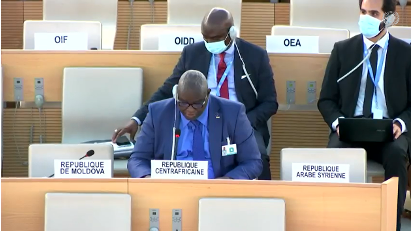 Mr Arnaud Djoubaye Abazene, on behalf of the country concerned, emphasised that the government has taken action to stabilise the political climate and diffuse tensions to ensure upcoming democratic elections take place in a peaceful manner. The government has also targeted combative groups causing civil unrest. The representative noted that the head of state is focused on combatting impunity, by holding sessions at the Criminal Court from April until June 2022. During this period numerous GBV cases were seen, and fundamental human rights violations were examined in depth. Mr Abazene stated that the International Criminal Court has dealt with cases that fall under the Expert’s mandate and in terms of transitional justice, the Truth Justice, Reparation and Reconciliation Commission (TJRR) has been active in the 2022 prefectures. The African Union contributed by organising capacity building training for members of the TJRR body. The representative highlighted that in respect of the country’s international and regional commitments in promoting and protecting human rights, the CAR, on 15 April 2022, set up a National Action Plan to combat the trafficking of children which targets the prevention of recruitment of children in armed conflicts. The statement on the abolition of the death penalty was reiterated by the representative who highlighted the recent adoption of the National Action Plan to combat sexual and gender- based violence in the CAR.
Mr Arnaud Djoubaye Abazene, on behalf of the country concerned, emphasised that the government has taken action to stabilise the political climate and diffuse tensions to ensure upcoming democratic elections take place in a peaceful manner. The government has also targeted combative groups causing civil unrest. The representative noted that the head of state is focused on combatting impunity, by holding sessions at the Criminal Court from April until June 2022. During this period numerous GBV cases were seen, and fundamental human rights violations were examined in depth. Mr Abazene stated that the International Criminal Court has dealt with cases that fall under the Expert’s mandate and in terms of transitional justice, the Truth Justice, Reparation and Reconciliation Commission (TJRR) has been active in the 2022 prefectures. The African Union contributed by organising capacity building training for members of the TJRR body. The representative highlighted that in respect of the country’s international and regional commitments in promoting and protecting human rights, the CAR, on 15 April 2022, set up a National Action Plan to combat the trafficking of children which targets the prevention of recruitment of children in armed conflicts. The statement on the abolition of the death penalty was reiterated by the representative who highlighted the recent adoption of the National Action Plan to combat sexual and gender- based violence in the CAR.
What is more, the CAR government has set up a national mechanism for the prevention of torture by organising a thought sharing workshop on the matter in June 2022. The government has also implemented missions focused on raising awareness of human rights violations. For instance, a mission was set up among the armed forces to educate them on respecting and upholding international human rights treaties and legislation. It was revealed that all school infrastructure had been liberated from rebels, permitting children to enter education facilities freely. In his concluding remarks, he emphasised that the CAR has achieved palpable actions to bring peace to the country and above all, promote human rights. Nonetheless, Mr Abazene emphasised that global support would further consolidate peace and stability in the country. Accordingly, he called for international solidarity to further mobilise the CAR’s resources to ensure a definitive and lasting restoration of peace.
 The representative of the European Union stressed the importance of retaining commitments made to combatting impunity in the CAR, which is an essential component in the peace-building process. The CAR was commended on the opening of the Criminal Court which is addressing impunity and crimes committed during the conflict which violate international human rights treaties. State authorities were encouraged to strengthen the effectiveness of the national judicial system. The representative of the EU concurred with the statement provided by the Expert and commended the recent abolishment of the death penalty. However, concern was raised over the high volume of international human rights and humanitarian law violations including sexual and gender-based violence perpetrated by armed groups and mercenaries from the Wagner group. It was further stated that violations against children including the recruitment of child soldiers must cease. The representative underscored that the CAR faces a severely compromised socio-economic situation where 63% of the population requires humanitarian assistance and questioned the Expert on what recommendations he could make in finding a resolution to the crisis in the CAR.
The representative of the European Union stressed the importance of retaining commitments made to combatting impunity in the CAR, which is an essential component in the peace-building process. The CAR was commended on the opening of the Criminal Court which is addressing impunity and crimes committed during the conflict which violate international human rights treaties. State authorities were encouraged to strengthen the effectiveness of the national judicial system. The representative of the EU concurred with the statement provided by the Expert and commended the recent abolishment of the death penalty. However, concern was raised over the high volume of international human rights and humanitarian law violations including sexual and gender-based violence perpetrated by armed groups and mercenaries from the Wagner group. It was further stated that violations against children including the recruitment of child soldiers must cease. The representative underscored that the CAR faces a severely compromised socio-economic situation where 63% of the population requires humanitarian assistance and questioned the Expert on what recommendations he could make in finding a resolution to the crisis in the CAR.
 The representative of Senegal highlighted the numerous civil wars which have plagued the country and prevented it from economically prospering. He reiterated the statement made by the EU and France, underscoring the migration crisis and the strain placed on humanitarian aid, despite the ceasefire. It was stated that the general population continues to live under constant strain and the threat of violence. Threats against MINUSCA continue to harm local communities and the peacekeeping mission’s ability to implement its civil protection mandate and conduct investigations. The representative stated that while they congratulated the work conducted by the Truth Justice and Reconciliation Commission, the situation on the ground, informed by MINUSCA was that the cessation of hostilities continues to be an immediate goal and a measure of the credibility of the joint road map for the process of reconciliation. In his concluding remarks, he called on the international community to support the CAR government in its efforts to combat impunity and that the government continues to investigate and prosecute perpetrators of human rights violations.
The representative of Senegal highlighted the numerous civil wars which have plagued the country and prevented it from economically prospering. He reiterated the statement made by the EU and France, underscoring the migration crisis and the strain placed on humanitarian aid, despite the ceasefire. It was stated that the general population continues to live under constant strain and the threat of violence. Threats against MINUSCA continue to harm local communities and the peacekeeping mission’s ability to implement its civil protection mandate and conduct investigations. The representative stated that while they congratulated the work conducted by the Truth Justice and Reconciliation Commission, the situation on the ground, informed by MINUSCA was that the cessation of hostilities continues to be an immediate goal and a measure of the credibility of the joint road map for the process of reconciliation. In his concluding remarks, he called on the international community to support the CAR government in its efforts to combat impunity and that the government continues to investigate and prosecute perpetrators of human rights violations.
 The representative of the United Nations Children’s Fund (UNICEF) remarked that the crisis in the CAR, specifically attacks against the civilian population continues to have a devastating impact on the rights of women and children. The number of cases of sexual violence involving women and children is increasing year on year. Accordingly, UNICEF reiterated its call for all parties to the conflict to take necessary measures to prevent all forms of violence against civilians. The representative concluded that UNICEF was committed to working alongside the government to support the realisation of the rights of all children in the country.
The representative of the United Nations Children’s Fund (UNICEF) remarked that the crisis in the CAR, specifically attacks against the civilian population continues to have a devastating impact on the rights of women and children. The number of cases of sexual violence involving women and children is increasing year on year. Accordingly, UNICEF reiterated its call for all parties to the conflict to take necessary measures to prevent all forms of violence against civilians. The representative concluded that UNICEF was committed to working alongside the government to support the realisation of the rights of all children in the country.
On another point, the representative of the 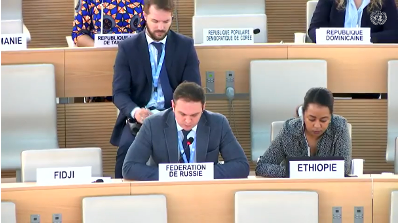 Russian Federation averred that the human rights challenges in the CAR were engendered by many years of civil conflict, raging violence, terrorism, and lawlessness. He drew attention to the fact that actors in the international community are exacerbating the situation by sponsoring insurgents. The representative stated that the CAR is heavily reliant on MINUSCA to bring about peace and urged the peace-building mission to respect the wishes of the national government. The CAR authorities were commended for their implementation of the National Programme for Disarmament, Demobilisation and Reintegration as well as parliamentarians who passed the recent Bill on the abolition of the death penalty.
Russian Federation averred that the human rights challenges in the CAR were engendered by many years of civil conflict, raging violence, terrorism, and lawlessness. He drew attention to the fact that actors in the international community are exacerbating the situation by sponsoring insurgents. The representative stated that the CAR is heavily reliant on MINUSCA to bring about peace and urged the peace-building mission to respect the wishes of the national government. The CAR authorities were commended for their implementation of the National Programme for Disarmament, Demobilisation and Reintegration as well as parliamentarians who passed the recent Bill on the abolition of the death penalty.
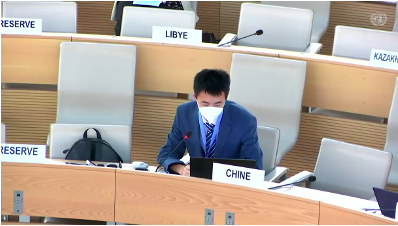 Contrastingly, the representative of China maintained that since the end of the CAR’s most recent presidential election, the human rights and security situation in the country has improved. It was emphasised that China has always supported the CAR’s peacebuilding process and has provided assistance within its capacity. The representative asserted that the CAR government should be allowed to solve any domestic issues in an African way by employing African solutions to the problem. He went on to state that China will continue to pledge support to the African Union and its operations, which continue to play a significant role in the country. Furthermore, the representative supported the CAR’s efforts to promote and protect human rights and called on the international community to provide constructive assistance in accordance with the needs of the CAR government. It was stated that China is willing to collaborate with the international community to help the CAR achieve peace, security, and development.
Contrastingly, the representative of China maintained that since the end of the CAR’s most recent presidential election, the human rights and security situation in the country has improved. It was emphasised that China has always supported the CAR’s peacebuilding process and has provided assistance within its capacity. The representative asserted that the CAR government should be allowed to solve any domestic issues in an African way by employing African solutions to the problem. He went on to state that China will continue to pledge support to the African Union and its operations, which continue to play a significant role in the country. Furthermore, the representative supported the CAR’s efforts to promote and protect human rights and called on the international community to provide constructive assistance in accordance with the needs of the CAR government. It was stated that China is willing to collaborate with the international community to help the CAR achieve peace, security, and development.
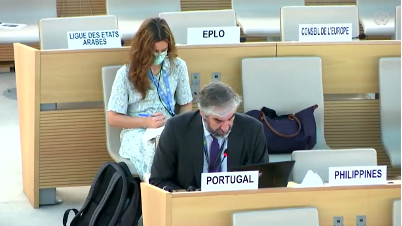 The representative of Portugal aligned his statement with that of the EU in that it remains concerned about the human rights situation in the CAR. The representative was particularly alarmed by the violence committed by state groups and members of private security companies. He reaffirmed the urgent need to ensure that all groups involved in the conflict are held responsible for their actions as it is an essential step towards creating trust between the government and its people. Portugal was particularly concerned about the proliferation of disinformation campaigns concerning international partners and MINUSCA. Portugal has two hundred personnel and a reaction force involved in the country and such campaigns have a negative effect on the peace building process, democracy, and the security of the UN forces. Peacebuilding in the country requires open dialogue that includes all stakeholders in the country. The representative emphasised that it is essential for the success of the Rwanda joint-road map, to ensure the implementation of the 2019 agreement for peace and reconciliation.
The representative of Portugal aligned his statement with that of the EU in that it remains concerned about the human rights situation in the CAR. The representative was particularly alarmed by the violence committed by state groups and members of private security companies. He reaffirmed the urgent need to ensure that all groups involved in the conflict are held responsible for their actions as it is an essential step towards creating trust between the government and its people. Portugal was particularly concerned about the proliferation of disinformation campaigns concerning international partners and MINUSCA. Portugal has two hundred personnel and a reaction force involved in the country and such campaigns have a negative effect on the peace building process, democracy, and the security of the UN forces. Peacebuilding in the country requires open dialogue that includes all stakeholders in the country. The representative emphasised that it is essential for the success of the Rwanda joint-road map, to ensure the implementation of the 2019 agreement for peace and reconciliation.
NGOs then provided statements in response to the Independent Expert’s update on the mandate. Most NGOs provided parallel responses, highlighting the need for an independent task force to deal with the illegal arms trade in the country following the arms embargo. NGOs condemned the use of hate speech and requested the national hate speech plan be implemented with concrete and urgent targets. The Criminal Court was commended for its work in prosecuting perpetrators of human rights violations. Concern was expressed over attempts to repeal the Constitution and the international community was encouraged to support the national education system. The recruitment of child soldiers into rebel groups and government forces was also highlighted, including the increase in sexual violence related to the conflict. NGOs concurred that children’s rights are increasingly under threat and their rights must be urgently prioritised.
Concluding remarks
Mr Yao Agbetse stated it was evident that the ceasefire was not being respected by all parties of the conflict. He underscored that neighbouring countries must prevent illegal imports of arms to rebel groups, channelled through their borders and work with the local government to inform the CAR of any changes in the hostile North Easter regions of the country. Regarding impunity, the Expert referred to the local government and emphasised that focus must be placed on tackling this issue and finding redress for victims.
Position of Geneva International Centre for Justice
Geneva International Centre for Justice (GICJ) commends the Council for extending its mandate on the CAR. We encourage the CAR government to expel illegal mercenaries in the country and invest its resources into the prevention of the illegal arms trade. GICJ remains concerned over the alleged human rights violations committed at the hands of the national army, including extrajudicial executions of suspected CPC members, attacking civilians, occupying government buildings, and looting private property. Attacks on humanitarian workers by armed groups and unidentified persons is extremely worrying. It is imperative that the government secures its political hold over the country to facilitate the proper functioning of humanitarian aid facilities.
According to the UN Food and Agriculture Organisation, the number of people facing acute food insecurity increased from 1.9 million to 2.29 million in 2021. UNICEF has also indicated that over 40% of children under the age of five were already chronically malnourished. Therefore, it is paramount that humanitarian aid is given safe access to the country and protected whilst performing their duties. Due to the current deficit in the number of qualified medical personnel and essential medicines available within the CAR, we urge the international community to donate medical supplies to resolve this crisis. Following the COVID-19 pandemic the country would also benefit from vaccine support as the majority of its population remains unvaccinated.
Central African Republic, Human Rights, Vulnerable groups, United Nations, Justice, Human rights, Geneva, geneva4justice, GICJ, Geneva International Centre for Justice






